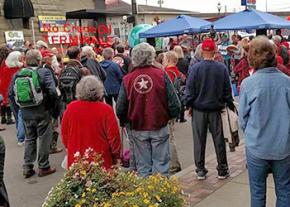Keep the oil trains out
reports on mobilizations by activists fighting to stop dangerous oil trains from coming to Grays Harbor County, Washington.
RESIDENTS ARE fighting to keep dangerous oil trains out of the Port of Grays Harbor on Washington state's coast. Some 200 people turned out October 8 for a hearing at the D&R Theater in Aberdeen to testify against plans to open two new petroleum storage facilities.
The proposed facilities, known as the Westway and Imperium Expansion Projects, would store both Bakken oil from North Dakota and tar sands crude from Alberta, Canada. If the facilities are built, an additional 16 tanker trains per week would travel to fill the new tanks with 72 million gallons of crude.
The trains now being used consist of 100 tanker cars, 85 percent of which are outmoded DT-111 model cars. The trains carrying Bakken oil have an increasing record of explosions in the U.S. and Canada.
While activists would like to stop the trains altogether, they can do little locally because the trains' travel is considered part of interstate commerce, which falls under federal jurisdiction. However, local governments control the issuance of permits to build storage facilities. Therefore, if activists can stop additional facilities from being built, the trains won't come because they will have no place to put their cargo.

The Westway and Imperium projects require both a local permit from the city of Hoquiam and a state permit from the Department of Ecology. Both require an environmental impact statement to guide the decision to issue, or not issue, the permits.
Testimony at the hearing was almost unanimously opposed to issuing the permits. Some speakers used findings contained in the draft environmental impact statement (DEIS) as evidence of the risks if the expansion takes place. Others pointed to the inadequacies of the DEIS findings.
Some speakers addressed the effect that additional oil burning would have on global warming. As Dr. Kelly O'Hanley of Physicians for Social Responsibility put it, "Denying permits [to build] is the most important thing we can do to attack climate change, the biggest threat to human health."
Most of the speakers weren't professionals, however, but were working people from elsewhere in Washington as well as the two adjoining states. People from small towns along the rail line spoke about how the tracks run through the center of their towns, so a derailment that results in a spill would devastate their entire community. "Any benefits would only come to Grays Harbor," said a speaker from northern Idaho. "The rest of us along the rail line get no benefits whatsoever, but we would assume all of the risk."
EVEN IF there isn't a derailment resulting in an oil spill, there are health hazards from the emissions that escape both oil and coal trains. Patricia Bowdy, who has been a heart and lung therapist for 40 years, pointed out that the poorest people who live along the railroad tracks are the most susceptible to the diseases that the emissions cause.
Another concern is the Juan de Fuca tectonic plate, which is located off the Pacific Coast across from Grays Harbor and is subducting under the North American plate. Volcanologists fear that the stress could result in a massive earthquake producing a tsunami wave over 20 feet high. If that happened, the stored oil spread throughout the area of the harbor.
Oil train explosions, however, remain the primary worry locally. "The risk is not theoretical," Jarrod, a Grays Harbor resident, explained. "We have seen oil trains explode across North America including five oil train derailments in as many months."
The hearing was divided into two sessions, and between the sessions, activists gathered for a protest in front of the theater. One of the fears of both native and non-native fishing industry workers is the devastating effect of a marine oil spill. While tar sands oil doesn't have the volatile flash point of Bakken crude, a tar sands spill in water is almost impossible to clean up.
The Quinault Indian Nation has issued a statement that oil trains thus endanger their traditional fishing grounds, which are guaranteed by an 1856 treaty. The Quinaults were joined at the protest by the Chehalis, Quileute and Squaxin Island tribes together with non-native workers in the fishing industry.
"We are not alone in this fight," Quinault Fawn Sharp told the crowd. "We have allies all around the world who know that we are at a crisis."
For many years, old-growth forests provided a thriving industry of shipping both raw logs and milled lumber from the port. But old-growth trees have since run out, leaving high unemployment in the area.
The oil and railroad industries have promised the carrot of new jobs and tax revenues if the projects are permitted, but the people of Grays Harbor aren't buying it. They have vowed to keep fighting until new oil train traffic is canceled for good.


